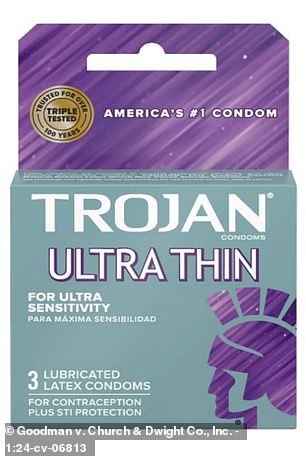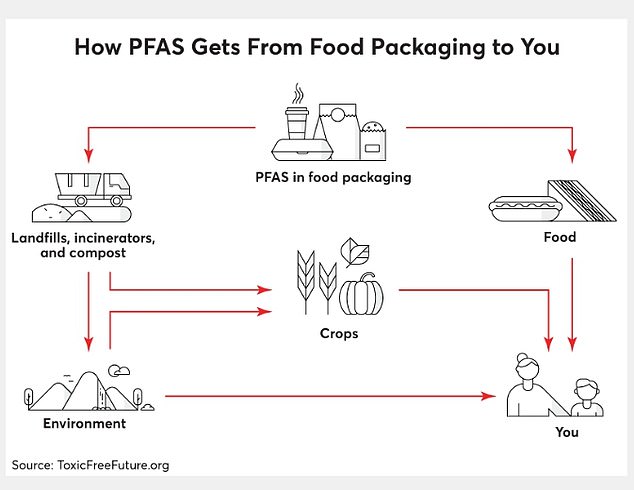America’s most popular condom brand is being sued over allegations it failed to disclose how its product contained toxic chemicals.
Matthew Goodman, the only person named in the proposed class action, purchased a package of Trojan Ultra Thin condoms from a New York pharmacy in October 2023. The package was then sent to an independent lab and found to contain PFAS, microscopic substances linked to infertility and cancer.
The proposed lawsuit — which names about 100 other unnamed individuals in addition to Goodman — is against Church & Dwight Company Inc., the maker of the brand, which is estimated to be worth $24.9 billion.
The lawyers said their clients would not have purchased the product if they had known it contained these chemicals and that its packaging should make these claims clear.

The proposed lawsuit alleged that the products’ packaging does not disclose the presence of PFAS. The attorneys said: “Based on the label, she reasonably believed that the product was safe for use on her genitals. But the product contained PFAs.”
“Defendant’s false and misleading statements and material omissions are intentional and reckless, and render its condoms useless or less valuable,” reads the lawsuit, filed both in New York and nationwide.
In recent years, PFAS, also known as “forever chemicals,” have gained national attention for their widespread use in everything from pesticides to packaging.
Research suggests that the vast majority of Americans have at least a small amount of these chemicals in their blood.
Some of these are flushed out of the body, but others get trapped in the bloodstream, building up over time and causing inflammation, which could explain their link to a wide variety of health problems.
Dr. Linda Birnbaum, a board-certified toxicologist with the National Institute of Environmental Health Sciences, said these chemicals have been linked to “a tremendous increase in what are called chronic noncommunicable diseases: asthma, heart disease, cancer, stroke, premature birth. We’re seeing huge declines and problems with fertility.”
In 2020, Trojan was once again the most popular condom brand in the U.S., sold to an estimated 25 million consumers. According to StatistaCompetitors such as Durex and Lifestyles sold 5.3 million and 6.7 million people respectively.
A 36-pack of Trojan Ultra Thin condoms sells for $20.49 at Target — about 0.57 cents per individual product.
It is unclear how much Mr. Goodman paid when he purchased this product at his local New York pharmacy.
But the complaint said he said he checked the product label when purchasing Trojan Ultra Thin condoms and did not see any information or statements about PFAS.
The prosecution team sent the condoms to an independent lab for testing and found they contained PFAS. It’s unclear whether they tested only the Ultra Thin condoms or whether they also included any of the 30 other types of condoms Trojan makes.
The lawsuit claims that if Goodman and other plaintiffs had known there were PFAS in the products, they would not have purchased them or would not have purchased them for the same price.
The lawsuit claims that Trojan is able to charge a “premium above the price of condoms charged by competitors and generic manufacturers.”
Mr. Goodman therefore suffered “economic damages” due to “misrepresentations and omissions.”
The more than 100 people named in the suit are seeking economic damages, which together could exceed $5 million in interest and costs.
This is the first known class action lawsuit of its kind filed against a condom manufacturer.
Another study earlier this year on condoms also found PFAS in Trojan products. Commenting on that study, Dr. Birnbaum said, “Since condoms are an exposure to the most sensitive areas of the human body, for both men and women, I strongly recommend that the industry identify and eliminate these chemicals immediately.”


The graphic above from Toxic Free Future shows how toxic PFAS chemicals enter food products.
In recent years, lawsuits have been filed against other consumer products over concerns that their products or packaging may contain PFAS. These include lawsuits against SnappleTarget bandages and Kerrygold butter.
The Snapple and Kerrygold lawsuits have been dismissed and the Target lawsuit appears to be ongoing.
This is likely related to increased public awareness about the use of forever chemicals, which are used to make plastic, building materials, paint and agricultural chemicals.
From these streams, chemicals can reach your body through inhalation, ingestion, or application to the skin. The molecules are so small that, if you are exposed to them in high enough quantities, they can pass through the pores of your skin and be absorbed into your bloodstream.
The skin on the genitals is slightly thinner and more absorbent than the skin covering the rest of the body, and heat can speed up the absorption of chemicals in general, the lawsuit alleged.
The 24-page document She says: ‘Female and male genitals have delicate tissues that are more likely to absorb chemicals than other areas of the body. When condoms are placed on the genitals, PFAS can be easily absorbed.’
Once chemicals enter the bloodstream, some remain there and build up in the body over time, which can cause the health effects that experts like Dr. Birnbaum highlight.
However, The EPA points out This buildup is likely only common in people frequently exposed to high levels of permanent chemicals, such as factory workers and firefighters.
Still, according to the lawsuit, there should be a warning for condom users that they could be exposed to these chemicals when using a Trojan product.
The brief reads: “No reasonable consumer would expect a product marketed for use on the genitals to contain dangerous PFAS, which are indisputably linked to harmful health effects in humans. Accordingly, Plaintiff and Class Members suffered economic damages as a result of purchasing the product.”


